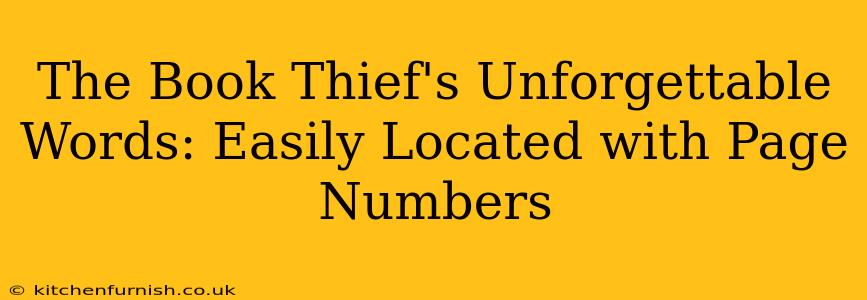Markus Zusak's The Book Thief isn't just a story; it's an experience. The novel's power lies not only in its poignant narrative but also in the unforgettable words woven throughout its pages. Finding specific quotes can be challenging, but this guide aims to make locating those impactful passages easier, offering a blend of iconic lines and lesser-known gems, along with page number references (note that page numbers may vary slightly depending on the edition). Remember, the beauty of The Book Thief is often found in the context, so exploring the surrounding sentences will enrich your understanding.
Please note: Providing exact page numbers for every memorable quote across all editions would be impractical. The goal here is to provide a helpful starting point for your search, focusing on key themes and sections. Consult your specific edition for precise location.
Death's Narrating Voice: A Unique Perspective
One of the most striking aspects of The Book Thief is the narrative voice of Death himself. His observations offer a unique and often darkly humorous perspective on the human condition.
What are some of Death's most memorable quotes?
Death's commentary provides both a poignant and darkly humorous counterpoint to the harsh realities of the novel. While pinpoint page numbers are edition-dependent, searching for phrases like "I am always interested in beginnings," "I had a job to do," or reflections on humanity's capacity for both good and evil will lead you to some of his most impactful pronouncements. His musings on the nature of stories and their ability to survive even the darkest of times are particularly poignant.
What is the significance of Death as the narrator in The Book Thief?
The choice of Death as narrator immediately sets a unique tone. It imbues the story with a sense of inevitability and yet simultaneously highlights the preciousness of life. Death's detached yet empathetic perspective allows for a broader, more encompassing view of the events unfolding, enabling readers to grapple with the themes of loss, resilience, and the enduring power of human connection. Look for passages where Death directly addresses the reader, reflecting on his own role and the human experience.
Liesel Meminger's Journey: Words as Weapons and Comfort
Liesel Meminger, the protagonist, is a complex character who finds solace and strength in words. Her journey of self-discovery is intricately interwoven with the power of storytelling.
What are some of Liesel's most important words or actions in the story?
Liesel's actions are often more powerful than any single quote. Her act of stealing books, her defiant spirit in the face of oppression, and her unwavering loyalty to her foster family are crucial elements of her character arc. Look for passages depicting her reading aloud in the basement, her interactions with Max, and her reactions to the bombing raids. These moments vividly reveal her character growth and emotional depth.
What is the significance of the book stealing in The Book Thief?
The act of stealing books becomes a powerful symbol of rebellion and hope. For Liesel, books represent not only escape but also a way to connect with others and find meaning in a world consumed by war and fear. Examine passages highlighting her first stolen book, her growing love of reading, and the transformative power words have on her life. Consider how the books she steals mirror the events of her life and how those parallels help readers to interpret the book's themes.
Max Vandenburg's Hidden Stories: Words as Survival
Max, a Jewish refugee, finds refuge in the Hubermanns' basement and utilizes words as a form of both survival and resistance.
How does Max use words to cope with his situation?
Max's story is one of survival, both physical and emotional. He utilizes his writing, particularly his creation of the story within a story, as a way to process his trauma and maintain his spirit. Look for passages describing the creation of The Standover Man, examining how this story within a story acts as a coping mechanism and a testament to the power of imagination and the human capacity to endure.
What's the significance of the story Max writes within The Book Thief?
The story Max writes serves as a powerful metaphor for the enduring strength of the human spirit. It reflects the horrors of war and persecution while simultaneously illustrating the resilience of hope. By creating his own narrative, Max reclaims a sense of control and agency in a world where much has been taken from him.
The Power of Words in a Time of War
The Book Thief masterfully utilizes words to explore the devastating impact of war and the resilience of the human spirit.
How does the book portray the power of words in wartime?
Throughout the novel, words serve as both weapons and solace. They can be used to incite hatred and violence, but also to inspire hope and foster connection. The contrast between Nazi propaganda and the quiet acts of reading and storytelling is pivotal. Explore passages that show how words are used to control, manipulate, and inspire.
What are the most important themes in The Book Thief?
Key themes in The Book Thief include the power of words, the resilience of the human spirit, the horrors of war, the importance of family and friendship, and the enduring power of hope. Each chapter reinforces these themes, making the novel as meaningful and thought-provoking today as when it was first published.
By exploring these thematic sections and searching within your edition for keywords and phrases relating to these topics, you'll easily uncover the unforgettable words that make The Book Thief such a captivating and enduring novel. Remember to appreciate the context surrounding these quotes to truly grasp their full significance within the narrative.

